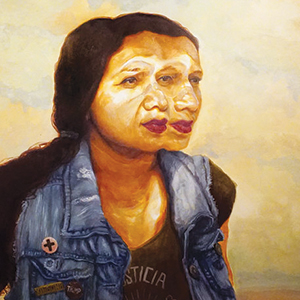The artists included in the sixth annual Chicana/o Biennial at MACLA are alert and prepared for battle. The culture wars are actively and purposefully raging in San Jose during the few remaining days before the PEOTUS raises his right hand at the 2017 inauguration ceremony.
The exhibit’s statement of purpose begins with a quotation by the journalist Jorge Ramos: “I have a right as a U.S. citizen, immigrant and reporter to ask questions.”
When Ramos was escorted out of a Donald Trump news conference in August 2015 for doing his job, the conflict between the reporter and the real estate magnate resonated symbolically for both pro- and anti-Trump constituents. Here was a white man, vying for national influence and power, spouting blatantly racist statements (“They’re bringing drugs. They’re bringing crime. They’re rapists.”) being questioned by a Latino reporter about Mexican immigrants. Last month, about half the country embraced Trump’s indefensible assertions. The Biennial is poised to serve as a rebuttal to a poisonous era of such damaging political rhetoric.
Like most of the work featured here, Zeke Peña’s painting, Sandra de la Frontera, embraces and transcends its category. As part of his Bravo/Grande Series, it is one of several two-faced portraits, like Siamese twins attached at the cheek. A ghostly white bird of prey straddles and connects the two faces as the three-eyed woman gazes at something outside of the frame, a desert in the distance.
On Peña’s own website, there’s a second version of the painting in which he’s placed “Sandra” on a background with vintage movie posters. The bold and oversized movie titles make for a livelier, if more obvious, statement (“Rio Grande Wetbacks” hovers in the background). But they complement each other and it would have created a jarring effect if both had been chosen to hang side by side: twins reflecting twins on a changing American landscape.
As the total population of Latinos has grown within that landscape, Linda Vallejo has transformed sets of data and statistics to create “The Brown Dot Project.” In a series of paintings that were inspired in part by modernists like Chuck Close and Charles Gaines, Vallejo combines brown dots (“I am literally counting one Latino at a time!”) and squares to reflect a number or a percentage. From this group of paintings, the one representative here is National Latino Artists 9.12%, 2016. A painter’s easel made of dots rests on a pale blue canvas lined with grids. The easel and the figure illustrate the population of Latino artists in America. Vallejo has worked out a highly detailed system that takes ownership of an abstraction by transforming a number into something concrete.
One of the paintings that directly responds to Trump’s call for a wall along the Mexican border is We Dream of Ways to Break These Iron Bars, 2016 by Eric Almanza. Three people stand on the other side of an impassable fence. Their hands extend through the spaces between planks. There’s a biblical quality to two of the figures. One woman genuflects with her palms opened up to the sky. A second woman in robes looks down in silent prayer or meditation. The painting suggests a photograph by Richard Misrach from his “Border Cantos” series that was on display earlier this year at the San Jose Museum of Art. The view, from the other side of the fence, is the same but Almanza fills in the space with people, whereas Misrach captures a bleak sense of emptiness. Both works remind the viewer how inhumane it is to separate people, regardless of their ethnicity or nationality, by a man-made and artificial border.
The overall effect of the exhibition is literally written on the wall. There’s a Call to Action: “How will you step up in 2017? Share how you will create change in your community this coming year.” You can pick up a colored piece of paper, write down your action plan and pin it up in the gallery. It’s one piece of weaponry these artists are advocating for in the fight against racism, and the first step toward winning the long battle ahead.
Chicana/o Biennial
Thru Mar 12, Various Times, Free
MACLA, San Jose



